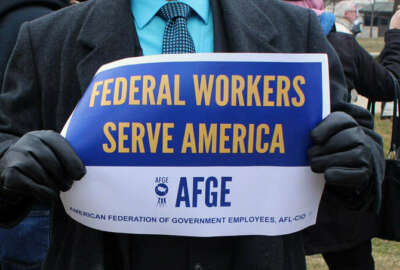Think you were exposed to COVID at work? There’s a lawsuit for that
The largest federal union has filed a class action lawsuit for employees who think they were exposed to COVID-19 at work. There's even a web site where people can...
Best listening experience is on Chrome, Firefox or Safari. Subscribe to Federal Drive’s daily audio interviews on Apple Podcasts or PodcastOne.
The largest federal union has filed a class action lawsuit for employees who think they were exposed to COVID-19 at work. There’s even a web site where people can sign on. With details, from the law firm Kalijarvi, Chuzi, Newman & Fitch, partner Heidi Burakiewicz spoke to the Federal Drive with Tom Temin.
Interview transcript:
Tom Temin: Heidi, it seems like you’ve become the queen of the class action lawsuit here for the federal government. Update us on what’s going on.
Heidi Burakiewicz: Well, we filed this case in March 2020. It was the first lawsuit filed on behalf of workers anywhere in the country, arising out of the pandemic. And what we wanted to do, I was worried about all of the clients that we have and I wanted to help tell their story about what they were going through. I mean, people were truly, if you recall, back in March 2020, there was so much uncertainty about the pandemic, people were getting sick people were dying, it was an incredibly frightening experience, even for those of us who could work from the safety of our own homes. But here, this case is about the people who had to leave their homes, go into the workplace, risk getting COVID, risk bringing it back to their families, their children, you know, I wanted to tell their stories, and get them hazard pay. They’re definitely entitled to hazard pay, quite frankly, I don’t know, even that is enough to compensate these employees for what they did. And these are the people who kept the rest of us safe, kept the country up and running.
Tom Temin: Does this new website indicate that new people are eligible?
Heidi Burakiewicz: Well, anyone who left their house was exposed to COVID. For example, I got to work from the safety of my own phone. But essential federal workers couldn’t do that. They had to go make sure the prisons were staffed, the meatpacking inspectors, the TSA agents, they couldn’t stay home, they had to leave their homes. And as a result were exposed to COVID. I mean, it’s just everywhere, it’s very prevalent. So this is the same case that we filed in March 2020, the first case that was filed on behalf of federal workers. But what’s happened now is yesterday, we launched a website, hazardpaylawsuit.com. So that employees can go and sign up, we have a long list of original plaintiffs in the case, those are the people who were willing to put their name on the case, file a lawsuit and try to get hazard pay for the rest of the federal workforce. But now we’re opening the case up for the rest of the federal workforce to sign up.
So in a traditional class action, you’re automatically in part of the case, but because of the court that we’re in, and one of the laws that we’re suing under, each employee must fill out paperwork to join the case. And so that’s the phase of the process that we’re in now, we’ve launched our website, it just takes a few couple of minutes, no risk to anyone, nobody has to pay to be part of the case, it’s risk free to join up. It takes five minutes go to hazardpaylawsuit.com so that we can make sure that you’re included as we lead this fight to try to get hazard pay for these employees.
Tom Temin: And what is the court and what is the statute that you’re citing specifically that requires this?
Heidi Burakiewicz: Sure. So the case is pending in the Court of Federal Claims, which is geographically located here in D.C., it’s a court that has jurisdiction over pay claims against the federal government. It’s the same court where we filed and are litigating our cases arising out of the government shutdowns. And then the law that we’re suing under Title V of the U.S. Code provides hazardous duty pay for GS or GL scheduled employees, and environmental differential pay for wage grade employees. So that’s the law that we’re suing under to get the hazard pay.
There’s also a component an overtime claim a Fair Labor Standards Act claim as well. Because once employees get that hazard pay, if you’re a GS employee, once you get the hazard pay, it’s 25% of your salary. And then any overtime that you worked now is going to get paid out at a higher rate. So there’s also an overtime component claim as well. And we know people worked a tremendous amount of overtime. You know, I was with a group of employees who work at the Bureau of Prisons, I was with a union that represents those employees last week. And they were telling me the stories about how much overtime they work. So you could have a prison that had 800 inmates who had COVID, staff who were sick and dying with COVID. And every one of those inmates who had to leave and go to the hospital now you have to send they’re already understaffed, which is worsened by staff who are themselves out with COVID. And now every time an inmate goes to the hospital, you have to send staff there, they were working. People were exhausted working 16, 24 hours straight of overtime, so the case will not only get them the hazardous duty pay, but they’re entitled to a higher rate of overtime for all that overwork, overtime work they did during the pandemic.
Tom Temin: We’re speaking with Heidi Burakiewicz, she’s a partner at Kalijarvi, Chuzi, Newman & Fitch. And before launching this website, under the auspices of AFGE just the other day, how many plaintiffs had you signed up in the two years since it was originally filed?
Heidi Burakiewicz: Well, we had originally give or take, we have about 55 original plaintiffs. And they come from a great cross section of the country, all over the country, different agencies. And those are our named original plaintiffs. But so this is the first time that we really by launching the website opens it up for the masses of federal employees to sign up. And you know, in just a few hours, since we’ve launched the website, we’ve gotten a tremendous response already, I’d love to check back in with you, and tell you how many people we signed, but you know, we’re expecting that it’ll be a large number. And it’s, again, it’s important, everybody has to sign up to be part of the case. And we’re approaching two years since the pandemic started. And so I encourage everyone to sign up now as soon as possible to toll the statute of limitations because we want to make sure everyone is paid for every day that they were affected.
Tom Temin: And what’s your sense of the potential numbers of people that are eligible for the suit? I mean, there’s 2.1, 2.2 million federal employees on the civilian side, all of them or a half of them do you think or what?
Heidi Burakiewicz: Any federal employee who’s covered by the law, who had to leave their home and go to work during the pandemic, we encourage them to sign up for the case. You know, we had over 50,000 people join our lawsuit seeking damages for the workers who had to work during the shutdown and weren’t paid on time. And this is potentially a much larger number, because not all agencies were affected by the government shutdown. But truly everyone who had to leave their home to go to work was affected by the pandemic and exposed to COVID in the workplace.
Tom Temin: And what about Title 38 employees at Veterans Affairs and a lot of them are in AFGE, also.
Heidi Burakiewicz: Yes. I mean, I’m honored to work with AFGE on this case, because I think I’ve said it before, and I’ll say it again, you know, I’m a union person. And I have never been more proud to be affiliated with a union than I was during the pandemic Agencies and managers were not doing the right thing. People were literally getting sick and dying. And the unions were screaming from the rooftops about the protections that needed to take place in order to keep people alive. So I’m delighted and honored to be working with AFGE on this case, and I know that they’re fighting for all of their employees. So unfortunately, I think Title 38 employees at the VA are not currently covered by the statute, I personally would love to see a legislative change and see that happen. You know, so it’s very interesting, the government has already given hazardous duty pay to employees of, some employees at the VA are getting some type of COVID bonus. Employees that work for the Public Health Service, there are medical officers, they’re getting hazardous duty pay. So you have this incredibly interesting dynamic, you have these PHS employees, and you know what they’re entitled to that money, I want everyone who risked their health and safety is entitled to it. But it’s this incredible dynamic where you employees of the Public Health Service, who are stationed and assigned to work inside a prison. These medical officers are getting hazardous duty pay because of the pandemic. And the GS-7 correctional officer is not.
Tom Temin: Yeah, that that is a kind of irony, because I think anyone that works inside a prison wall should get hazardous duty pay, because it’s inherently hazardous, if not from COVID, than from the other folks that are not there voluntarily. All right, and just a final question, the class action lawsuits over the pay for working during the government shutdowns, you’ve got two of those from the most recent one and the one back in 20, whatever it was, those have taken a long time to wind their way through the courts to get to a decision, and then for the government to figure out each person’s individual pay. What’s your timeline estimate for this? Should you prevail?
Heidi Burakiewicz: Well, we won in the shutdown arising out of that Oct. 13 shutdown, we won that case in the trial court, and the government’s now appealed it to the Court of Appeals for the Federal Circuit. They’ve also taken an interlocutory appeal on our case, Tarovisky v. United States arising out of 35-day government shutdown in 2018, 2019. The briefing is complete on all of the cases as of about two weeks ago. So we’re just waiting for an oral argument date to be set. The cases are all going to be heard by the same three judge panel on the same day, and litigation is never fast. But wow, in 2013, you know, the government, a lot of people said we couldn’t do it. We couldn’t win. And we did. Working on the briefing, I am so confident that the law is on our side, the government violated the Fair Labor Standards Act. They didn’t act in good faith as the trial court found. I also think the violation was willful, and I’m really looking forward to this oral argument and the decision from the court of appeals, because the next time government is faced with a budget impasse, I want them to be aware of this decision and think about the federal employees, the federal workforce who’s affected. People really suffer during these shutdowns, not getting paid, not knowing how they’re going to pay their bills, their medical bills, feed their kids, pay for gas to get to work. And let’s not let this happen again. The country can’t run without these employees, and we need to make sure they’re treated fairly.
Tom Temin: Attorney Heidi Burakiewiczis a partner at Kalijarvi, Chuzi, Newman & Fitch, thanks so much for joining me.
Heidi Burakiewicz: Thank you so much for having me. It’s always a pleasure.
Copyright © 2025 Federal News Network. All rights reserved. This website is not intended for users located within the European Economic Area.
Tom Temin is host of the Federal Drive and has been providing insight on federal technology and management issues for more than 30 years.
Follow @tteminWFED
Related Stories






